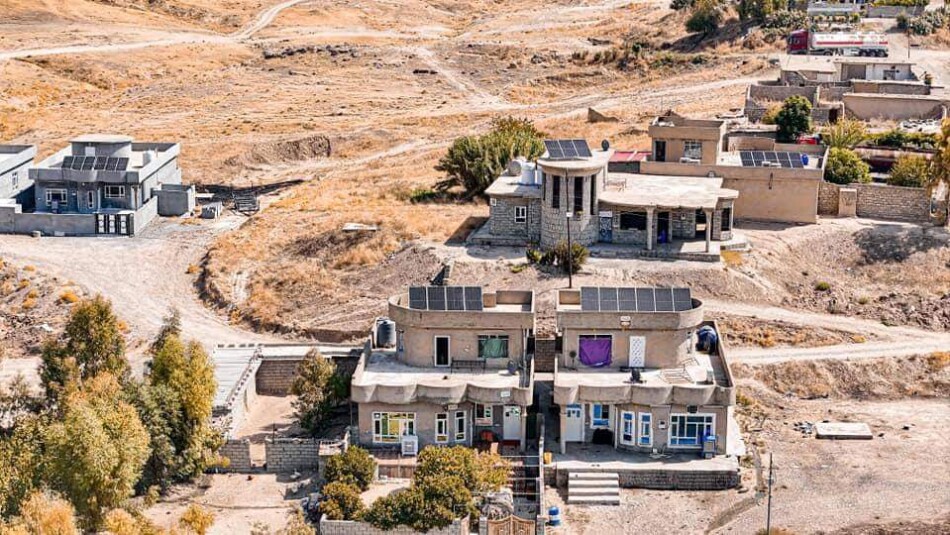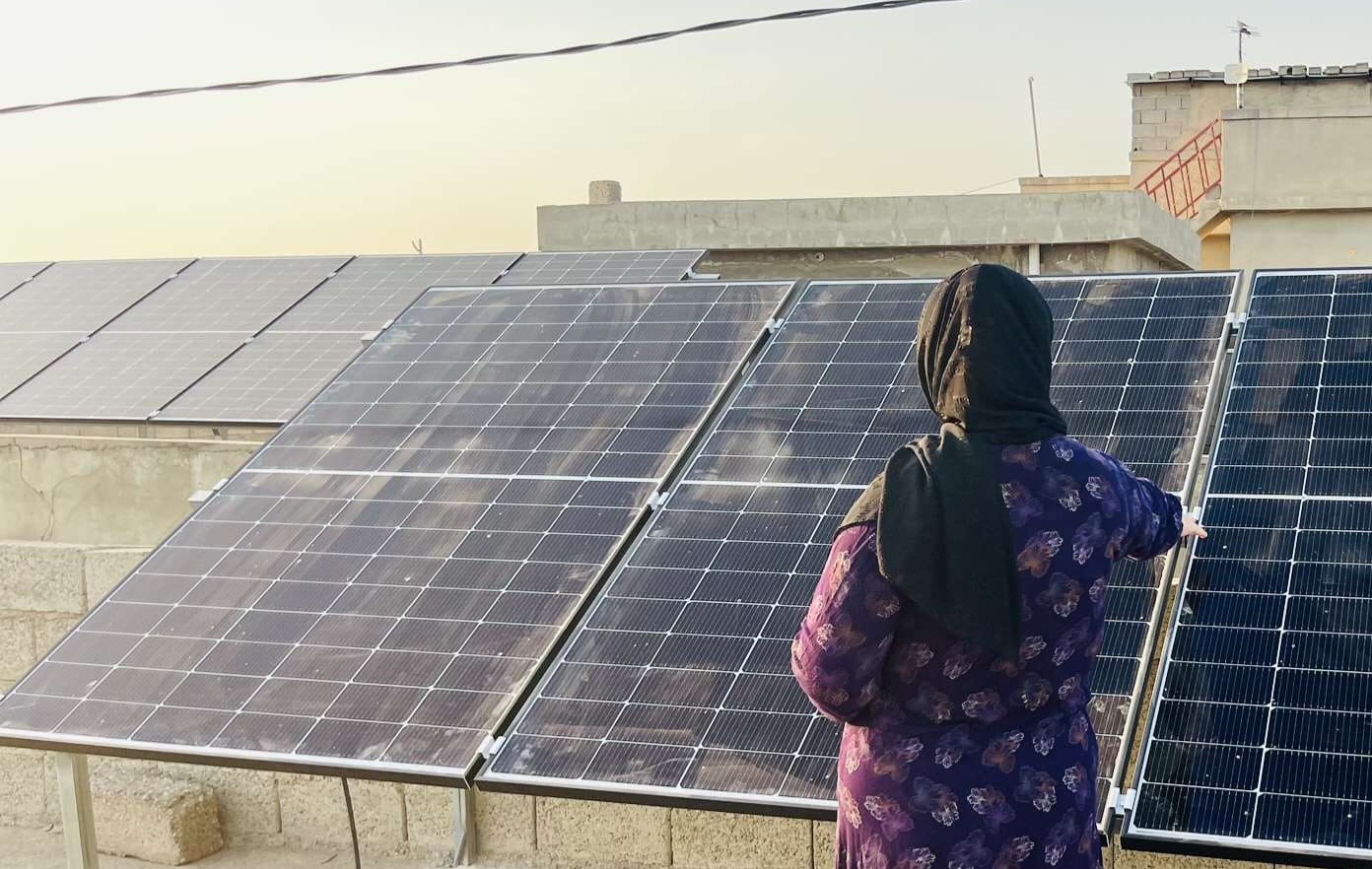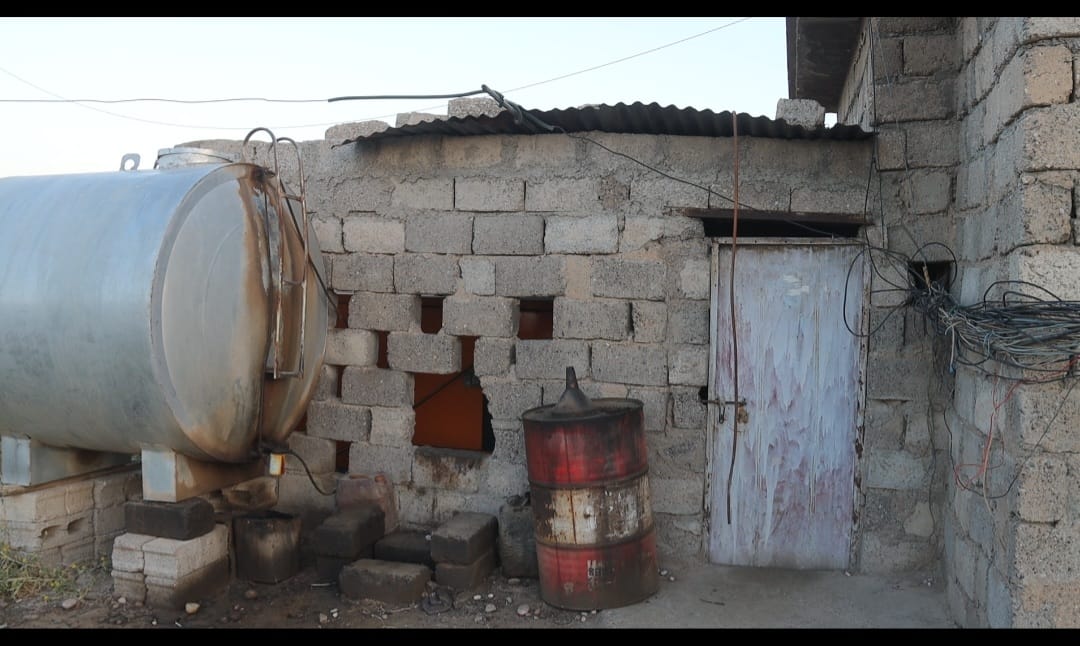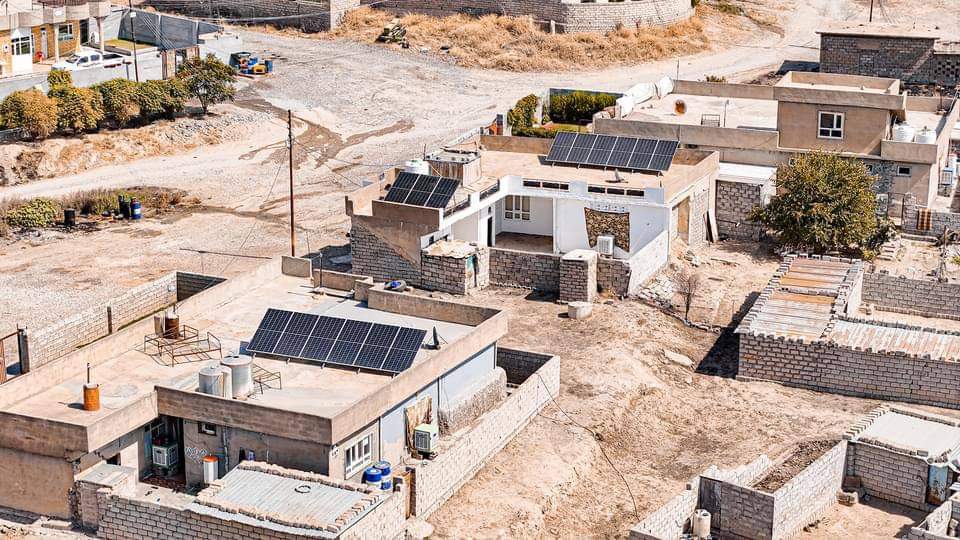
"We live in luxury like the people of Qatar and the Emirates," says Samira Ali, who lives in a remote village in Duhok Governorate, after they succeeded in providing electricity to the village around the clock.
All residents of the village rely on solar energy to produce electricity, and Samira says that they now live in a clean environment free of the noise and smoke of generators.
The village of Tirba Sipi, where Samira lives, is 125 km southwest of Duhok Northern Province. The scene there is different from the rest of the villages in the region, as its residents have become happier than others compared to two years ago.
"We haven't had an electricity crisis for two years because we rely on solar energy. We stopped operating the generators and don't wait for the government to provide us with electricity. We've been very relieved," Samira adds.
"Previously, we used to receive national electricity for one hour a day. We got rid of the national electricity bills, private generators, tobacco and fuel. We now live like the residents of Qatar and the Emirates. We have electricity 24 hours a day."
All the residents of the village, which is home to 45 families, installed solar energy systems to generate electricity. It is an environmentally friendly system used as an alternative to generators that run on fuel.
We got rid of the national electricity bills, private generators, tobacco and fuel
Following gulf war in 1991, the Iraqi state infrastructure was sharply hit by the economic embargo on Saddam Hussein regime due to damage of many transmission lines and substations leaving the basic services provided by the state inadequate.
Few years later, the local authorities gave permission to installation of private diesel generators in the residential neighborhoods to provide power and fill in the national power outage as it could provide only half of the demand on national network of state-subsidized electricity.
The cost of the power provided by private generators is couple of times double of power provided by the state thus people are obliged to consume as less as possible during national power outage in order to pay less for private generators.
Jalal Issa, the Mukhtar (meaning chosen in Arabic, the head of a village or a neighborhood) of the village of Tirba Sipi, was one of the first to take the initiative to install a solar energy system in the village. He says that the idea was successful and all the villagers welcomed the initiative.
Issa said that when the benefits of this system were mentioned for the first time, "we decided to try it and benefit from it." So he decided to install the system at a cost of USD3,000 three thousand dollars (4.5 million Iraqi dinars IQD) and it consists of six panels and four batteries that provide the house with 10 amperes of electricity.
Following the Mukhtar’s initiative, the villagers learned about the benefits of the system and that it is environmentally friendly, "so everyone decided to install the system," Jalal added.
"Our village got rid of the problem of electricity, noise and smoke from generators, in addition to the electricity fees for generators, and we even installed solar energy systems for the school and the mosque."
The amount of electricity produced by the solar energy system depends on the number of energy panels used, the more the number, the higher the cost and the amount of electricity produced.

Samira Ali, a resident of the village of Tirba Sipi, cleans the solar energy panels on the roof of her house, Dohuk, September 2024. Saja Ismail
The electricity generators in the village were running on gasoline and diesel until two years ago. "They were a source of smoke and noise," Issa said.
Although there are no official statistics on the number of users of solar energy systems in Duhok, 236 subscribers have been registered in the Duhok Electricity Directorate, and this comes after the Ministry of Electricity issued a decision stipulating reductions in the national electricity bills for users of solar energy systems.
According to statistics from the Kurdistan Regional Government KRG Ministry of Electricity, there are 6,000 private generators in the region, 2,000 of which operate in Duhok.
Ammar Jassim, an environmental activist in Bardarash District - the village of Tirba Sipi is part of the district - supports the use of solar energy.
“Private generators have a significant impact on environmental pollution, in addition to the smoke emitted, the pollution of the environment with their waste... In general, they have negative effects on all elements of the environment, air, soil and groundwater."
Jassim believes the government does not monitor the generators well to know the type of diesel used to operate them.
Private generators have a significant impact on environmental pollution
However, Hakar Hiruri, the head of the Dohuk Private Generators Association, said that "generator owners are committed to our instructions, they must use high-quality gas oil."
This comes while no generator owner has been held accountable for using low-quality diesel so far.
Dr. Dillman Youssef, from the Cancer Control Department in Dohuk Health Directorate, says the main cause of cancer is air pollution, especially lung cancer. "Generator smoke is a major source of environmental air pollution, along with vehicle exhaust fumes and the use of low-quality gasoline."
According to (IQAir), a Swiss company working in the field of air quality technology, Iraq's air is among the "most polluted" in the world. According to the KRG Ministry of Health, environmental and air pollution is one of the reasons for the increase in cancer cases, as 9,911 new cases were recorded in the Kurdistan Region of Iraq KRI in 2023, with lung cancer being the second most common.
The head of the Civil Generators Association issued instructions to generator owners to allocate green spaces around the generators by planting 10 seedlings, in addition to obligating them to pay 10,000 dinars per meter annually to the Environmental Protection Authority as compensation for polluting the environment.

The place designated for a diesel power generator in the village of Tirba Sipi, whose residents stopped operating it, Duhok, September 2024. Saja Ismail
Most citizens do not have the financial ability to install solar energy systems, that’s why electrical engineer Osama Ali urges the government support people willing to install solar panels.
"It is possible to install solar energy systems throughout Kurdistan by the private sector, provided that they receive financial support from the government."
"Installing solar panels is expensive, but in the end it will be very beneficial for the environment and increase electricity production," he added.
Therefore, the mayor of Tirba Sipi village, Jalal Issa, calls on the government to provide facilities for all people to help them install solar energy systems.
Ahlam Mohammed, who holds a master’s degree in renewable energy, believes that the regional government is failing to take the necessary steps to benefit from solar energy to produce electricity, while Iraq’s environment is suitable for benefiting from this energy due to the high temperatures, and the weather in Iraq, in addition it is sunny in summer most days of the fall and spring.
"The goal of resorting to renewable energy is to maintain the cleanliness of the environment and reduce carbon dioxide emissions and other harmful emissions," she added.
The goal of resorting to renewable energy is to maintain the cleanliness of the environment
Mohammed says that the Ministry of Electricity can, instead of installing smart meters and restricting citizens to consume a specific amount of amperes, spend its capabilities in the field of renewable energy, especially in villages.
The KRG Ministry of Electricity, in a plan aimed at encouraging citizens to benefit from solar energy, issued a decision to reduce the national electricity fees for users of solar energy systems, provided that they register their names with the ministry to integrate the system with the national electricity, but the residents of the village of Tirba Sipi indicated that they were not aware of this decision.
Azad Tariq, a teacher who serves in the village but not a residnet, installed a solar energy system and says, “I am not aware of the decision, but I have not integrated my system with the national electricity because they say that this will cause the system to fail. If the system breaks down, it will cost me 500,000 dinars to repair it.”
Mohammed suggests for the KRG to impose solar system a must for newly-built residential complexes.
“Since the population is increasing day by day, the demand for electricity will increase. As a first step, it is possible to oblige residents of residential projects to benefit from solar energy.”
Bargasht Akraye, media director of the Kurdistan Region Investment Board, pointed out that the board suggested to the government that installing solar energy systems be a condition for granting a license to establish residential projects, but the decision has not been made yet.
“The decision is currently being implemented in some gas stations and public places.”

"According to our estimates, the cost of installing the system in the Kurdistan Region is close to two billion dollars. If a decision is made in this regard, the region will enjoy electricity around the clock," Bargasht said.
If the solar energy system is installed in the Kurdistan Region, 6,000 private generators will be removed.
According to environmental activist Ammar Jassim, "we will have a very clean environment and round the clock electricity," like the one enjoyed by the residents of the village of Tirba Sipi.
Dr. Khunaf Hassan, environmentalist and university professor, says, "According to scientific studies, individuals who are more exposed to the fumes of diesel and vehicles that operate on this type of fuel have a higher rate of contracting various diseases." “Stroke, cancer and Alzheimer’s disease are the consequences of inhaling smoke from burning gas, this is what studies have proven,” so Khunav welcomes the initiative of the village of Tirbe Spi.
The village headman said, "We got rid of the smoke from the generators and their monthly fees... The cost of installing generators in the villages is greater, because the population is small, so the monthly fees will increase."